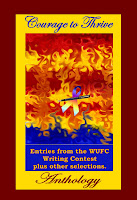This is the kind of book that you don't see very often.... something that you get so very excited about and cannot stop reading or talking about.
This book speaks to anyone who has an idea for anything. Of course I relate it to writing and that is where the fun begins....
As writers we come up with ideas for books. We ponder them.... we consider the audience and how they would see it and we sometimes take a long time to spit out the words and have enough courage to send the manuscript off for professional people to judge..... but with this book Richie Norton pulls out all the stops. Chapter after chapter he convinces you that whatever idea you have...it is worth something. No matter what age you are or what season in your life you are living, the time is now to write that story. You will never regret it.
Consider this: A guy by the name of Pierre Omidyar wants to sell used stuff on the internet. He says of the guy he pitched the idea to: "First he told me it was stupid idea....and then he agreed to come on board. Ebay was born and look at the success...
Here's another one....David Neeleman (CEO of JetBlue Airways--the one who created the electronic airline ticket) says of his new found idea: When I proposed that idea, people laughed at me, saying no one would go to the airport without a paper ticket. Now everyone does and it has saved the industry millions of dollars."
Pretty cool I say. There are so many other examples of companies who were laughed at and then ended up making millions. But back to authors---did you know the author of The Help, Kathryn Stockett went through 66 rejection notices before someone saw the brilliance of her first novel? It is amazing that 66 agents/publishers thought the idea wouldn't work. But she didn't let her dream die...
This book gives everyone hope. Whatever you want to do, says Richie Norton, do it now!!! No time like the present and if it doesn't work out at least you tried. You are going to get a year older anyway...
Check out The Power of Starting Something Stupid by Richie Norton.....
Here's what Amazon has to say on the book:
"Richie Norton has written a book about courage. The courage to do work that matters and to do it with your heart and your soul. Go make something happen." — Seth Godin, author of The Icarus Deception
"Perfect book for these uncertain times." — Steve Forbes, Chairman and Editor-in-Chief of Forbes Media
 What if the smartest people in the world understand something that the rest of us don't? (They do.)
What if they know that in order to achieve success, they will sometimes
have to do things that others may initially perceive as stupid?The fact of the matter is that the smartest people in the world don't run from stupid, they lean into it (in a smart way).
What if the smartest people in the world understand something that the rest of us don't? (They do.)
What if they know that in order to achieve success, they will sometimes
have to do things that others may initially perceive as stupid?The fact of the matter is that the smartest people in the world don't run from stupid, they lean into it (in a smart way).In The Power of Starting Something Stupid, Richie Norton redefines stupid as we know it, demonstrating that life-changing ideas are often tragically mislabeled stupid. What if the key to success, creativity, and fulfillment in your life lies in the potential of those stupid ideas? This deeply inspiring book will teach you:
• How to crush fear, make dreams happen, and live without regret.
• How to overcome obstacles such as lack of time, lack of education, or lack of money.
• The 5 actions of the New Smart to achieve authentic success.
No more excuses. Learn how to start something stupid—the smartest thing you can do. Drawing on years of research, including hundreds of face-to-face interviews and some of the world's greatest success stories past and present, Richie shows you how stupid is the New Smart—the common denominator for success, creativity, and innovation in business and life.
Click here for the Amazon link to The Power of Starting Something Stupid






